Marc Scott Zicree is a veteran writer and producer for genre television and animation going back decades, including writing for He-Man, The Smurfs, Friday the 13th, M.A.N.T.I.S., The Incredible Hulk, Babylon 5, Sliders, and many others. As a life-long Star Trek fan, he also found time to regularly pitch stories for various Trek series, selling two along the way. TrekMovie chatted with Zicree about his history of pitching for Trek and about his new sci-fi series Space Command, which features a number of actors from Star Trek and other sci-fi TV shows.
Pitching Star Trek
You were one of the most persistent writers who would come into the Star Trek offices to pitch ideas during the TNG era. Can you take us through your history of that to getting your first sale?
Star Trek was always a huge influence for me and a big reason I became a writer. I was very aware of the show, even before it aired, I was I was already working on the Paramount lot as a television writer and story editor for Friday the 13th: The Series and I would see the Next Gen cast sitting at a table at the Paramount restaurant at lunch. After the episode “The Big Goodbye” came out, which Tracy Tormé had written, and I really liked it, and wrote him a letter and he called me and knew of my work, particularly The Twilight Zone Companion, and he asked me to come in to pitch. He liked several of my ideas, but he left before they could buy them. And this happened again and again and again. I pitched to David Gerrold and then he left, everyone I pitched to loved at least one more of the stories I was pitching, and would be fired or leave before we could get it through. It happened with Burton Armus and with Robert Justman and on and on.
But I kept coming in and finally Michael Piller was in charge, and got Ron Moore and Ira Behr and Melissa Snodgrass all those wonderful writers. So finally, it happened when I came in to pitch and it was the day before Thanksgiving at five o’clock and nobody wanted to be there. It was in Michal Piller’s office and the entire writing staff was seated on sofas watching me and I was standing pitching. Usually, I would work up five very detailed storylines, narrowed down from a start with like one hundred story ideas. I had five with a beginning, middle and end. As a back-up, I would have a few more that were just a paragraph, and then maybe some one-liners. This time they liked the first five, but there were various reasons [they passed on them], like they were too similar to things they were developing, so then I got into the paragraphs and there were reasons again, but they were impressed I could generate so much material.
So at this point I was in a cold sweat, I had been pitching for a solid hour, story after story and finally I got down to the one-liners, which had never happened in my career, and I said “Here is one, you have done stories about the Prime Directive where we deal with cultures that are at our level, like the Romulans and the Klingons and you have done a lot of stories where there are cultures that are below the level of the Prime Directive and you have to keep hidden from them, but you have never done a story where the culture reaches the point of technology where the Prime Directive shuts off and the Enterprise is sent to make first contact.” And their eyes lit up, and you can tell that was the one they never heard. And after the holiday I got the call they were buying it and that became “First Contact.”
What’s surprising about that, is how that episode is strangely structured for Star Trek as it is mostly from the alien point of view. So, that seems like a hard sell.
We all agreed it would be fun doing it like The Day the Earth Stood Still, except the Enterprise is Klaatu and Gort. So, we all got excited about the notion that it would be from the point of view of the people on the planet. And again, when I would go in to pitch to Star Trek or any show, I knew science fiction so backwards and forwards and every episode of Star Trek. So, I was always looking for what is a profoundly meaningful story that they haven’t done, that fills a hole in their mythology or some area they haven’t explored. Star Trek gives such a great opportunity to tell deeply moving and meaningful stories within that science fiction context and universe. “City on the Edge of Forever” taught me what science fiction on TV was capable of.
Your next sale was “Far Beyond the Stars” for Deep Space Nine, which seemed to take a long time from pitch to show. What are some of the big changes along the way?
With that, I pitched it to Hans Beimler and it took him a solid year to convince [showrunner] Ira [Steven Behr] to buy it. I pitched it during the fifth season and they bought it during the sixth. A challenge when you are a freelancer is, there are certain things you cannot do, but someone on staff could. I would never, ever, go into a pitch and say the story turns out to be a dream, because that seems like very lazy writing, So, I came up with something that I wasn’t really happy with. The original idea had it with Jake and he is a writer in the ’50s doing these Deep Space Nine stories and ultimately, we discover that the station is under attack by telepathic aliens who have been making Jake believe that he is a writer. But that was just a rationale for the part of the story I wanted to tell, which was to pay homage to that world of science fiction in the 50s with those great writers like Harlan Ellison and Ted Sturgeon, who had been my mentors. In addition to writing for the original Star Trek were great writers for magazines like Astounding and Galaxy in the ’50s.
So after they finally bought it, I got together for lunch at Nickodell’s next to the Paramount lot, with the writing staff. Ira had been thinking about it, and he makes it about Ben instead of Jake to up the stakes. And they all knew I wrote The Twilight Zone Companion and they all loved The Twilight Zone and wanted to do it like a Twilight Zone episode, like “A World of Difference,” the one where Howard Duff is a lawyer and suddenly they yell “cut” and we find out he an actor, but he believes he is a lawyer. So, we shift that reality. Am I in a dream, am I in someone else’s dream? And so, the moment they said that, I was thrilled because it was moving the story to areas that were more and more risky and more and more profoundly truthful areas. So, I wasn’t at all resistant to this direction. They wanted to make it more overtly about racism and I was hugely excited. We all knew this was going to be a landmark story, right there at that lunch.
After that, I went and wrote the outline which came out really well and tracked the story exactly as we talked about and as you see it. There were very few differences. One difference was instead of Worf being a baseball player, I made him a boxer and he secretly got a romance going with a white woman and the racist cops find out and they beat him to death. So instead of Jake getting shot, it was Michael Dorn who gets killed. Another difference was when Benny has his breakdown, the Armin character goes to bat for him and gets the story published, the idea being that Benny’s sacrifice and commitment to the truth moves someone else to be brave and put the story out.
We recently reported on the “Far Beyond the Stars” panel you were on with Ira, where he talked about pitching Rick Berman on bringing Benny back for the series finale, setting it up that the show was all his dream. What do you think of that idea?
It would have been very interesting, but it would have screwed up all of Star Trek’s chronology. Rick Berman is right to say if DS9 is a dream, then what about the original Star Trek, what about Next Gen, what about the shows coming down the pike? Are they all dreams of Benny Russell. Ira said he doesn’t care about the other shows. But, in reality, it would have been a strange, strange, strange oddity. So, I guess Rick was right. It would have been interesting and daring but would have hugely pissed off the fans.
I think it would have been interesting and I certainly would have admired Ira’s guts for doing that. I would have got a character payment for Benny, but in retrospect, it is okay that they didn’t do that. But again, I love courage and bold choices. Like when we were sitting around that table at Nickodell’s all of us and batting that story around, I was thrilled at the bravery. It was Ira Behr who was entirely responsible for that story existing because he went to bat for it. He had to convince Rick Berman and Paramount. This was going to be overtly about racism and Jake’s character is a teenager who breaks into a car and gets shot by racist cops. And now watching it twenty years later it has amazing resonance, it has more power now than it did then. It was courageous for a major studio to do that on a major science fiction show.
Creating optimistic sci-fi with Space Command
We first talked about Space Command back in 2012 when you announced your initial crowd-funding campaign. It was a bit different at the time, seen more as a movie and not a series. Can you talk about why you started it and what Space Command is now?
The initial impetus for me was to do something positive and inspiring like Star Trek was like for me as a kid. I wanted to do a space show that would basically say that we can reach across boundaries and barriers with compassion and build a better future. That is exactly what Star Trek said in the ’60s. And going back to 2012, a lot of the TV shows were very dark, very dystopic and television, in general, was about very dark characters, like Breaking Bad, which is a great show or Battlestar Galactica, another great show, but very dark. I wanted to tell a different story.
I started with a two-hour story. I had never raised money before, but rather than going out to get a pilot deal where I would be cut off at the script I thought I would see if I could raise money. I run a roundtable and mentor a lot of people and been hearing about crowdfunding. I wrote the first the first half of the two-hour and reached out to actors I wanted to work with. Armin Shimerman was a friend and we worked many times together, Ethan Phillips I liked and wanted to work with him, same with Bob Picardo, etcetera. I launched the campaign and it pulled in $221,000 and our target was just $75,000.
So, on the basis of that, I was able to build my studio and start shooting. What happened was as I was talking more and more about the project doing media interviews it grew and grew in my mind. It went from two hours to six hours to eight, to twelve hours and an entire season. I love the big canvas of TV and most of the work I have done is on TV because that is my favorite medium. So, by the time the campaign was done, I had this huge story in my head. So, I immediately sat down and wrote eight hours of Space Command.
What is the status of the production and release?
We shot the first two hours, what is now essentially a two-hour pilot, which has Doug Jones and Robert Picardo and Mira Furlan and Bill Mumy and Bruce Boxleitner. We are now in the post-production on that and showed the first half-hour at Comic-Con. We are going to show the first hour at the Drama Summit in London in November. By the end of the year or shortly thereafter we should have the entire first two hours done and we will be sharing that with our backers and investors.
We have also shot forty minutes of the second two-hour story, which has Faran Tahir from J.J. Abrams Star Trek. It will also have Christina Moses, who was in the Star Trek: New Voyages episode “World Enough and Time,” which I directed and she was on The Originals and Condor and is now on a new show on ABC. She also auditioned for the role of Michael on Star Trek: Discovery. We are planning on shooting the rest in December. We had a pre-production meeting last night. We are not waiting until we sell the show. We are moving completely ahead.
You have a new Kickstarter campaign going which wraps up in a few days. What is the goal of this new campaign?
This is entirely for visual effects and post-production to finish the two-hour Space Command pilot. This also includes sound design and music and color correction. I am committed to not showing a rough cut without those things plugged in. I have had experience of taking things to buyers without that and they wouldn’t understand it. We would love to crack $100,000, we are at about $73,000 now. And that will give us a lot of bang for the buck.
The show is highly serialized, which is a modern trend, but isn’t it also a call to science fiction nostalgia?
It’s nostalgic in its visual aesthetic. I grew up in the ’60s and ’70s and read old science fiction books and magazines from the 50s. Those magazines and books those covers were so wonderful from that era and I had never seen that aesthetic in a modern science fiction show and I thought it would be fun and a way to differentiate from Star Trek or Battlestar Galactica or shows with a very specific look. I wanted to do something that was different and cool and fun. I call it retro-future.
But it was never going to be tongue-in-cheek. It was never going to be winking at the audience. Each two-hour story has a beginning, middle and an end. But they link together to form a larger arc over the series, and a larger arc over the season, just like modern TV does.
The only other nostalgic element is I am using actors I worked with in the ’80s and the ’90s because they are terrific. Who wouldn’t want to work with Armin Shimerman or Bob Picardo or any of these people? I am also using actors I have met more recently like Mike Harney from Orange is the new Black. I would love to use actors from every iteration of Star Trek because they are such great actors. I very much want George Takei, and Brent Spiner and Jonathan Frakes and Gates McFadden and Michael Dorn and on and on. Star Trek has such a great history of really talented actors, it is a wonderful talent pool. And some of them get typecast, and some don’t. Some have not got the roles they deserve.
So, is the goal to sell the show to a streaming outlet or network, or do you see a possibility of doing the show entirely via crowdfunding?
Ideally, it would be lovely to have Netflix or Amazon or one of these streaming services buy it, but the reason I shot it rather than pitched it is because I wanted to be able to say “this is what it is.” If I tried to get this cast approved, no one would have said yes. They would have insisted I get rid of most of these actors and insisted I get actors who are on hit shows on The CW, whether or not they could act. I didn’t want to be jumping through those hoops again. They would have wrecked it. I didn’t want to be beholden to anyone. That is why I was willing to reach out to my audience because I trusted them more than I trust the studios or the networks.
So, now I can show them the pilot and can say “This is what this is.” And I can show them the other scripts and actors I intend to use. And if they buy into this vision of a hopeful future and not something dystopic, then we can partner up. But, I certainly won’t do it if they want to change it into something that is crap or something I don’t believe in.
If it doesn’t sell to a network or a streaming service, my goal will be to finance it through my audience, if possible. If you look at shows like Star Trek Continues or Star Trek: New Voyages, they were financed by the people watching it. CBS and Paramount pulled the plug because they owned the intellectual property. I did one episode of Star Trek: New Voyages, but I knew inevitably CBS was going to pull the plug. I own Space Command, so no one can tell me what to do and that gives me incredible creative freedom.
Ready to add Jordan Peele to The Twilight Zone Companion
Since I have you and you are so well known for The Twilight Zone Companion, I have to ask what are your thoughts of yet another reboot of the show, this time with Jordan Peele?
Most of the reboots of The Twilight Zone I haven’t liked. I actually wrote for it when they brought it back in the late 80s. That was a terrific writing staff with George R.R. Martin, Harlan Ellison, Alan Brennert, on and on, but it was very hit and miss. There were some great episodes like “Paladin of the Lost Hour” and “Her Pilgrim Soul,” but there were a lot of poor episodes. There wasn’t a consistency because Rod Serling brought that vision, but Richard Matheson and Charles Beaumont and George Clayton Johnson followed in his footsteps bringing their own voices and their own takes, but very much in his kind of universe. Then there was the one with Forest Whitaker [UPN’s 2002 The Twilight Zone] which was like “What the hell is this thing?”
But Jordan Peele, his Get Out could absolutely have been a Twilight Zone movie. They could have called it The Twilight Zone Movie and Rod Serling I am sure would have loved it, knowing his taste. When they announced Jordan Peele was going to be doing the new Twilight Zone, I thought that it was terrific. I think he is going to do a great job.
Black Mirror is really the closest thing to an inheritor of The Twilight Zone mantle. But the problem with Black Mirror is that it is so dark. There was one episode called “San Junipero” which was more upbeat and about love, and I liked that episode a lot. I have admired the other episodes like “USS Callister,” but they are so dark I can’t watch many in a row. Rod Serling was an optimist and not a cynic. Gene Roddenberry was also an optimist and not a cynic. And that is the kind of television that I personally prefer. I am interested to see what Jordan Peele will do because he will have upbeat messages. He is not a dark spirit.
The new edition of The Twilight Zone companion came out this year. It has 100 more pages of material. It has 500 more photographs and it has links to audio and video links to rarities, like the shows Rod wrote in the ’50s and commercials he did and lectures he gave and all sorts of stuff. And I did new interviews with Jodie Serling, Rod’s daughter, and George Takei, about his episode “The Encounter.” And the cool part, because it is audio and video links, is I can interview Jordan Peele and even though the book is out, I can put that online and have the link in the book link to that as well. And that is the plan, as I will be interviewing him soon.
Watch first half-hour of Space Command featuring Doug Jones and Robert Picardo
The Kickstarter campaign to finish post-production on the two-hour pilot wraps up on Monday. Visit Kickstarter for more details.
Marc Scott Zicree has posted the first half-hour of the two-hour pilot of Space Command on his Mr. Sci-Fi YouTube channel. He introduces the project, but you can skip ahead to 5:38 to just watch Space Command.

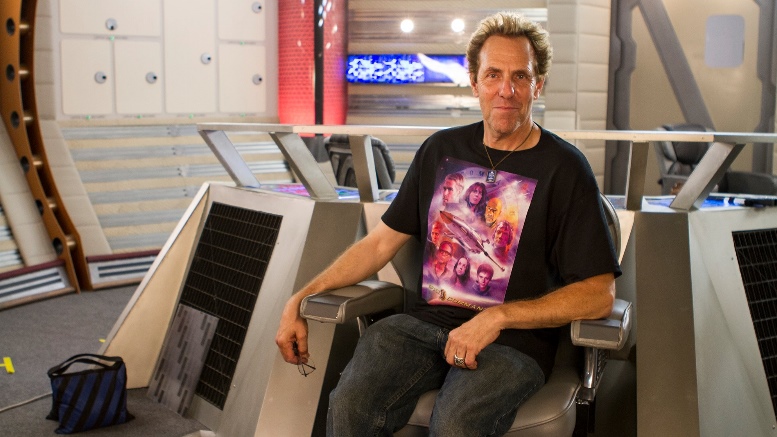


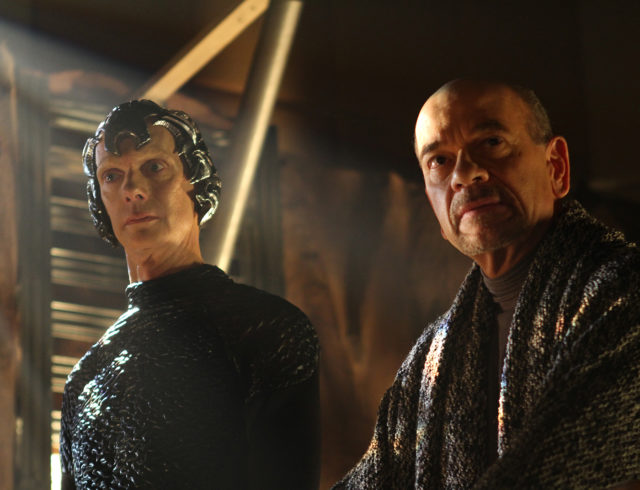

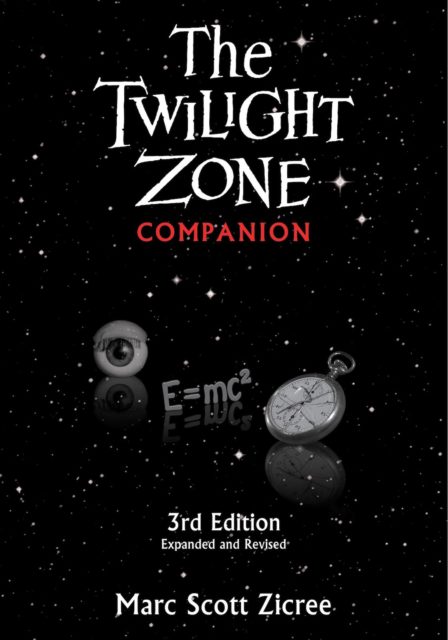
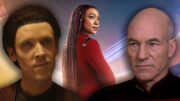
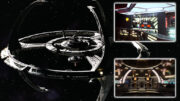
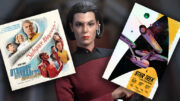
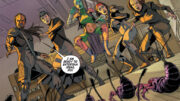
I tried watching the first 30mins, and while there are some great actors, the choppy editing and poor bluescreen effects significantly let the project down and took me out of the story. In particular, the car ride scene was very hard to watch. I wish Marc the best of luck, but this vanity project isnt his best work imho.
Beg to disagree. I liked the callbacks to 1950’s SciFi, the age of Asimov and Heinlien, smartly updated.
This was a tough watch. A very tough watch.
Loved his TNG and DS9 episodes
I like this 60s look and feel. And it reminds me a bit of Babylon 5, the GREATEST sci-fi series ever *ducks and covers*
BABYLON 5 was incredible – and the “arms race” between that and DS9 pushed DS9 to be the best it could be.
I don’t have time to watch the video right now, but I love everything Marc is saying! Definitely a project to keep an eye on; it sounds like he gets the soul of Star Trek.
A couple thoughts… I loved his story ideas for Trek. “First Contact” is one of my fav TNG episodes. But this Space Command video is simply unwatchable. It not just the effects and super fake looking green screen work, but also the foley sound (or lack of it) and stilted acting. Ditto on the terrible score. It all boils down to bad direction. And this tired cliche of a father and son and the macho tradition is just so 20th century and boring. It looks like a waste of time to make and a waste of money to fund. As a white guy, I’m wondering aloud, if we really need another story about white guys and their father and all that boring hold-over baggage from the last century. Felt like someone old was trying to recreate and rehash the stories of their childhood without capturing any of the magic and without making it relevant for the early 21st century. Terribly uninteresting.
Well, pretty much every US show these days is “relevant for the early 21st century”. Space Command is simply trying to do something different.
It’s not like they’re taking away your “diverse” shows. You still get to enjoy your current-year-relevant, sriracha-topped olmützer cheese sundae sprinkled with chocolate chips, raisins and roasted crickets, it isn’t going anywhere – so why not let the rest of us enjoy our plain old white vanilla, eh? That’s what true diversity is all about.
I’ll say one thing, at first glance, the spaceship designs and the story-line both look superior to what I saw on The Orville last year.
Love the tip of the hat to George Pal.
it could use a litle polish, a bigger budget and I would watch this show.
IMHO, Marc Zicree created the finest hour of Star Trek “fan film” in “World Enough And Time,” and for that, I am so grateful. Just wonderful, so much so that this old ST fan (and spouse) watched it several times, and we never get tired of it. Thanks, Marc!
I really enjoyed “World Enough and Time” as well. Great story. And I’m a big fan of the TNG episode he did, too.
Sounds like this guy has my dream job, in another life. Nice interview, thanks.